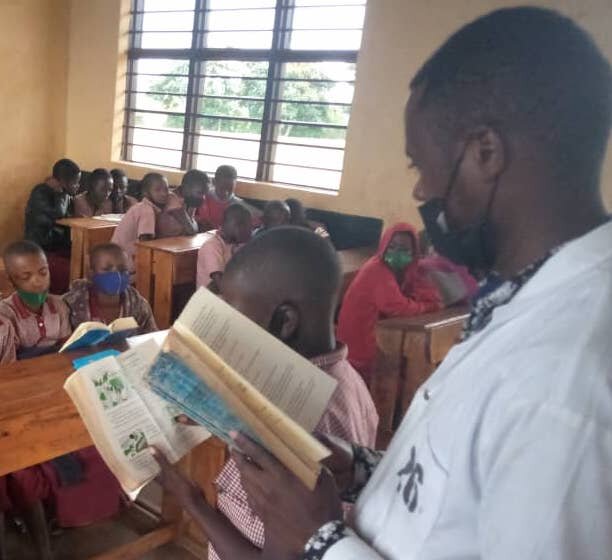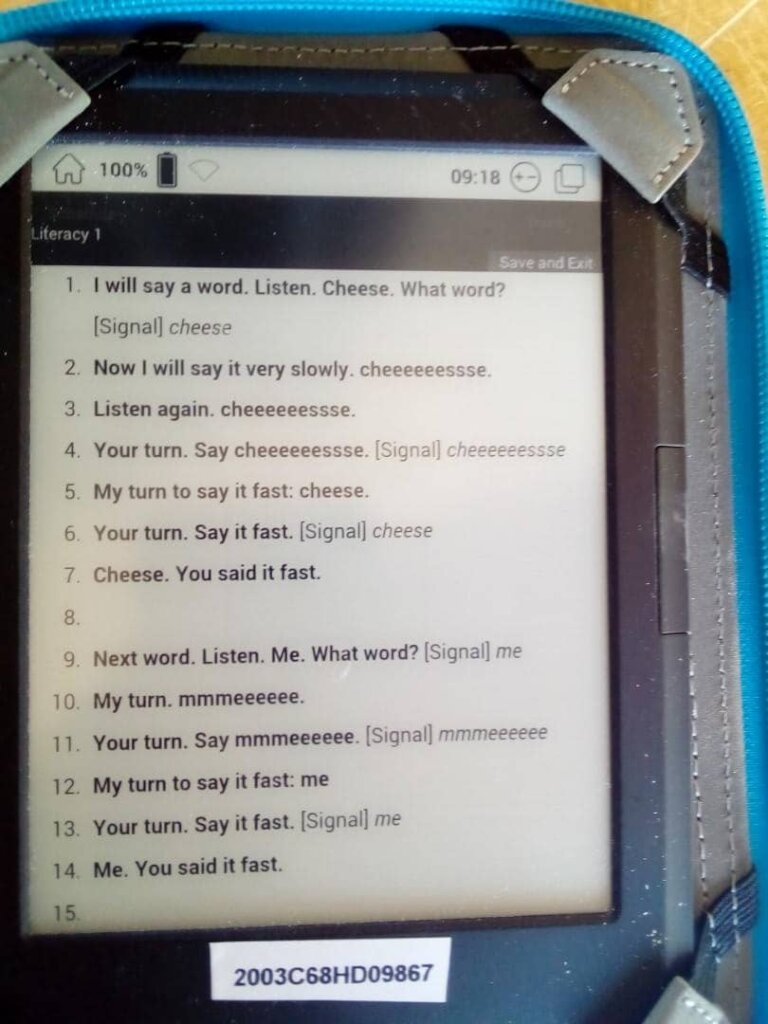By Katy Allen-Mtui | Director
I hope this finds you well and in good spirits.
The schools reopened again in January in both Rwanda and Tanzania.
Damian and Ivan are in their routine of visiting the primary schools where we work in Gasabo District, Rwanda. They are helping the teachers with the delivery of their English lessons. This is now needed more than ever with English as the medium of instruction for all school subjects from a pupil’s first day at school in Primary 1.
Claude is teaching his same pupils at Gasabo Primary School. He has taught them since Primary 1, and soon they will have completed primary school. It will be a very good test to see how they do in their end-of-school examinations having learned their English from our NOEC books since Primary 1. As shown in the picture, his pupils are now reading long stories. The pictures in the NOEC assist understanding, and the paragraphs are numbered so that comprehension questions are asked by the teacher after each paragraph. They are now reading one of the most-remembered stories in the book – David and the Lorry. David and his classmates go on a school outing to see the garden at another school. David knows the lorry driver and so sits in the front with him, and the other pupils and their teacher stand in the back. The lorry driver stops and gets out with the teacher to put in fuel. David presses a button he has been told not to press. The lorry lurches into life and sets off! Everyone is screaming, and the lorry goes faster and faster down the hill. David manages to turn the wheel and the lorry turns and goes uphill. Eventually a policeman runs alongside, gets in and brings the lorry to a stop. David, on return to school, is sent to the Headmaster. There are many illustrations which amuse the pupils, and they are really motivated to read from one paragraph to the next.
Whilst the pupils are having fun reading the story, they are, in fact, revising the past tense, the present continuous tense and the present simple tense with ‘What, Where, Who, When’ question words. They are practising countable and uncountable nouns (e.g. ‘There isn’t any petrol’), and the use of conjunctions. Claude is guided completely by his Teacher’s Notes with preparation before each reading of a paragraph, and the questions to ask and the answers to be elicited after each reading. Reading the story and answering all the questions will take at least 24 periods. This gives the pupils sufficient time and lots of repetition of language and practice for the English to sink in.
In the lower primary classes (Primary 1 to 3) there is still confusion after the many school closures for Covid. In January 2021 there were two categories of Primary 1; those who were in Primary 1 from January 2020 to March 2020 and then stayed at home for the rest of the year, and those who reached the age to join Primary 1 in January 2021. This situation has continued and there were more closures in 2021. The teachers who are using our NOEC books were and continue to be the most able to cope with having mixed ages and mixed abilities in their classes because of the sequencing of material in the NOEC and all the guidance given. The repetition of language and constant revision is the key to the NOEC’s success, and the teachers are wholly aware of this now.
A long-awaited meeting with the Director General of the Rwanda Education Board was to be held on Tuesday 8th February at 4pm. It was cancelled at 8am in the morning with a promise of rescheduling. We hope the meeting will now take place in early March. This is hugely frustrating as time is marching on and other factors are coming into play. Damian and Ivan have been monitoring the teaching in other primary schools so that they can inform the Director General of what is really going on. There is no question that the pupils learning English from the NOEC books are way ahead of other pupils.
However, our work with the teachers, and indeed with the pupils, in their teaching and learning of English is not being helped by some new government programmes. The pupils are now learning French in Primary 1. The reason behind this is that French was the country’s second language for many years. However, as English is now the second language, and the pupils are suddenly coping with English as the medium of instruction from Primary 1, it is not advisable in our view to introduce another foreign language. Although there are not many periods a week for the teaching of French, we still fear it will bring overload to the young pupils. Also, many of the teachers who knew French are no longer in the primary schools. This means that not only are many of the teachers who are teaching English struggling with English themselves, but now some of those who are assigned to teach French are struggling with that language.
More worrying than that, is a new programme set up by the Rwanda Government called Equip and using New Globe Education to provide the materials. The latter, in turn, is connected to Bridge International Academies. This was announced and started with no consultation with the big donor partners. As far as we know so far, the programme is expected to be in 761 of Rwanda government schools by 2024. it has already started in some primary schools, including one in the area where we work and so Damian and Ivan have been able to see it in action. The programme is based on the use of Tablets to give teachers scripted lessons. However, everything is in English, the teachers are not guided sufficiently in methodology, and from what we have seen there is a lack of any meaning being imparted to the pupils and just pure rote learning. Not only that, but the teacher’s only have access to that day’s work; they cannot look ahead or plan.
We hope that the government will still find a place for our work, but the meeting with the Rwanda Education Board is critical.
In Tanzania the picture is a bit clearer. The school being run by Loveland Makundi, Bright pre-primary and primary, is flourishing. It opened for the new school year in January 2022 with over 300 pupils. All but two of the classrooms in our building are now being used. That means that Loveland needs some more space for 2023. We doubt that we will be able to build any storeyed buildings but we hope to start to build some bungalow classrooms soon. Bright is an English-medium school but even so Loveland is keen for the NOEC books to be used. We are planning a meeting with him next week to discuss this.
Also there is a new Minister for Education in Tanzania and he has put out a plea for experts in the country to give him ideas for improvements in education. We wrote to him earlier this month and are waiting for any response. The new President of Tanzania has expressed her concern that education in the country must be a priority for improvement.
We are not yet free from challenging times, but our work continues to fulfil its aim of enabling teachers to teach English and enabling pupils to learn. Not only that, but within the use of the NOEC the pupils are developing the important thinking skills that are not covered in the government syllabus.
I am continuously grateful for the support of all of you; that you have got us through the worst of the Covid crisis is heart-warming. Thank you all very, very much.
With all good wishes
Katy
Project reports on GlobalGiving are posted directly to globalgiving.org by Project Leaders as they are completed, generally every 3-4 months. To protect the integrity of these documents, GlobalGiving does not alter them; therefore you may find some language or formatting issues.
If you donate to this project or have donated to this project, you can receive an email when this project posts a report. You can also subscribe for reports without donating.
Support this important cause by creating a personalized fundraising page.
Start a Fundraiser
